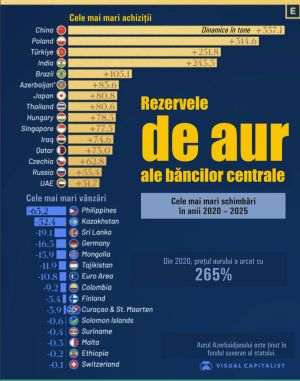Dumitru Chisăliţă, president of the Intelligent Energy Association, says that it is a good thing that our country has become a net exporter of electricity, but unfortunately we export at low prices and import at high prices, a fact that is reflected in the invoices issued to final consumers.
Dumitru Chisăliţă told the newspaper BURSA: "Against the background of the reduction in the consumption of electricity and natural gas by domestic consumers and industrial consumers, we found ourselves in the situation of having more energy than we actually consume. This makes me say that in 2024 we will most likely be a net exporter of energy, but we will remain a net importer of natural gas, even if we will also carry out electricity import activities. Unfortunately, the energy price is not going down, but there are at least two explanations for this. The first is the construction that exists in the Romanian market taking into account GEO 27/2022 regarding the capping of the price of energy and natural gas, and especially the way in which the electricity market operates based on this capping legislation. That is, we are talking about prices that are administratively set at some high levels, which actually means that in Romania there is very little chance that the price of energy will decrease in the near future. The second explanation concerns the way the system is built in the production area and the energy demand area. That is, we have a large production in general at times when there is no demand either in the national market or in the regional market, and I mean Saturdays and Sundays, I mean the time slot 10:00-18:00, when generally , if we look at the export curves, we see that we export during this period, when there is a surplus and the price of energy is very low, and we import during the hours when there is a deficit, namely in the evening and in the morning, at much higher prices. If we do an analysis, the ratio is from 1 to 3. Basically we sell cheap, we buy expensive, because of a system that was thought in a total disagreement between demand and supply".
Asked if storing the electricity produced during the day to be sold in the foreign market when the price is higher would be a solution, the president of AEI told us: "Unfortunately, this issue is not one that you can regulate from pen. It's a concept that you build and that involves especially technical aspects, commercial aspects that have to be put into an equation before you make this system. Once you've built it, there's not much to adjust. What did we do? We built some systems that produce a lot of energy, cheap energy, when nobody wants to use it, during the day. That makes us actually offload this energy that nobody has to consume to cheap export. The concept we have is that during peak hours we don't have power and then we import. In fact, we import when everyone wants to import: Hungary, Bulgaria, and Moldova. That's why we import at very high prices. This ill-conceived and poorly thought-out concept makes us taxed, and we will be taxed in the long run if we don't change this paradigm of paying some high prices."
Regarding the challenges, his lordship believes that, due to the decrease in consumption and the stabilization of prices in the international energy market which has a certain reflection in the Romanian market, the year 2024 will be a calm year as long as the elements that we have them at the moment. "That is, if we do not discuss any escalation of any conflict, whether we are talking about the conflict in Ukraine or whether we are talking about the conflict in the Middle East, if there are no other incidents, things will somehow remain in a calm area in 2024", he told us. - sent the president of AEI.
However, Dumitru Chisăliţă raised a warning signal regarding the existence of a potential deficit on the oil products market. Mr. Chisăliţă specified: "There is a study carried out by the International Energy Association that says that 2028 will be the year when the world will reach the maximum of oil production, after which there is an expectation of a decrease in this production to a production lower than the potential consumption and somehow what we see at the moment in the markets tends to confirm this situation. That is, we see an escalation in the price of crude oil, an escalation in the price of oil if we look at the last days, which is very possible to intensify and actually be the maximum challenge in energy in the year 2024".

















































